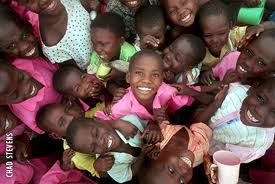 Africa’s population is set to double in the next 35 years, rising from 1.1 billion in 2013 to 2.4 billion by 2050. The population growth will further intensify economic disparities across the region. For example although Ghana and the Central African Republic (CAR) share similar fertility rates and age structure, the economic path of these two countries could not be more different.
Africa’s population is set to double in the next 35 years, rising from 1.1 billion in 2013 to 2.4 billion by 2050. The population growth will further intensify economic disparities across the region. For example although Ghana and the Central African Republic (CAR) share similar fertility rates and age structure, the economic path of these two countries could not be more different.
In order for a developing country to benefit from economic growth created by favorable shifts in the age distribution of the population, a number of factors must be present. The most significant determinants include: 1) a decline in fertility rates; 2) an adequate degree of political stability and accountability; and 3) sufficient economic opportunities. However, when divergent patterns appear, such as unemployment, excessively high fertility rates, political turmoil and governmental corruption, this demographic dividend becomes unattainable, and the probability of rebellion, violence, and civil war become dangerously high.
According to the African Development Bank Group (ADBG), the average annual growth rate in Ghana, which has teetered around 4.0% in the last 6 years, will remain consistent in the near future. Along with an energetic economy, fed by private sector investment and improved public infrastructure, the political landscape in Ghana continues to move in a pluralistic direction, with transparency and accountability on the rise.
While Ghana continues to move in a positive direction, CAR is currently enduring a brutal political situation and an uncertain economic future. As of 2012, the sectarian conflict between Muslim and Christian militias has thrown the country into political chaos and retarded economic growth. In particular, the massive humanitarian crisis has caused state institutions to collapse and forced nearly 930,000 residents to flee their homes.
According to the World Bank, in 2012 fertility rates in the CAR and Ghana are 4.5 and 3.9, respectively. In Ghana, however, more progress is being made to shrink that number. The National Family Planning Program has existed since the 1970s and between 1988 and 2008, use of at least one form of contraception doubled while the total fertility rate has dropped from 6.4 to 4.0. In contrast, due to political instability the Central African Republic’s citizens remain unaware of contraception methods and fertility rates are projected to remain high.
According to the Ibrahim Index of African Governance, Ghana was ranked in the top 10 out of 52 in categories such as education, human development, sustainable economic opportunity and business environment. The CAR on the other hand ranked in the bottom 20. The high cost of doing business in CAR has dissuaded investors and discouraged expansion in private sector leaving minimal revenue to be allocated for education and infrastructure.
With political stability, sound public management and government accountability, under-developed economies can create incentive for investments, widening the tax base for the state. Ghana abides by democratic principles and ranks amongst the top ten reformers identified globally by the World Bank’s Doing Business team. It has successfully stimulated high levels of private sector investment and public infrastructure development. Conversely in the CAR, corruption, instability and poor governance has created an environment unfit for investment, generating weak and unequal economic development.
Although Ghana, through smart policies and governance seems to be harnessing the potential of a large youth population, CAR’s youth bulge will continue to be a souce of instability in the coming years. Current CAR president Catherine Samba-Panza, declared that “bad governance, poverty and unequal access to power” have been the main source of frustration among the population, contrary to the belief that religious and ethnic differences are at fault. Governments across Africa should learn from the Ghanaian example and examine the factors that have led the country to be so successful. Ghana provides a model and strong evidence that good governance is ultimately the most important factor needed to bring about economic growth.




